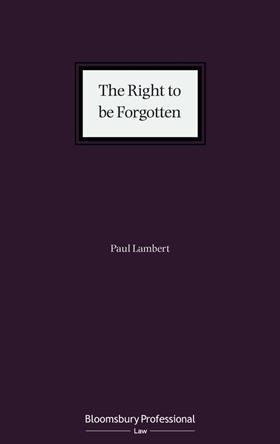The Right to be Forgotten, sometimes known as Personal Takedown and Forgetting, has developed in various international court cases and is incorporated in the GDPR.
The Right to be Forgotten
Paul Lambert
£165, Bloomsbury Professional
★★★✩✩
Let’s suppose you are planning the Christmas party and someone does a search on social media and finds some photographs taken at a previous function. There is one of you with your arm around a person you were seeing then, a photograph of the senior partner making the annual Christmas speech, and there are comments online about various cases the firm had been involved in which are not complimentary. Perhaps you search your own name and find information that is incorrect, or very personal information such as your bank account details or passport number.

There are perhaps some events we would prefer to forget – but modern technology never forgets. Once it is ‘out there’ it stays there. This book is about the legal right, in certain cirumstances, to get an organisation to remove information. This is the so called Right to be Forgotten, sometimes known as Personal Takedown and Forgetting. This right has developed in various international court cases and is incorporated in the GDPR. This issue is not new but the law has not, and probably never has, kept up to date with the pace of change in technological and social developments. The Right to be Forgotten is an attempt to address that.
There are counter arguments about the right to free expression and journalistic investigation. But there are valid issues about dealing with online abuse and revenge porn which involve old information or images. The consequences of such abuse can be, and often are, tragic.
This is an academic book which explains the legal background and current law in great detail. It is not an easy subject to describe. The Right to be Forgotten is limited in scope and geographically. After all, providers of online information are global, but the right to be forgotten is primarily a European one. The book explains the right, and the additional obligations on the data controller, though there are legal exemptions including freedom of expression and the need to keep information for legitimate purposes.
This is an essential text on an important, new area of law.
David Pickup is a partner at Pickup & Scott Solicitors, Aylesbury
- Would you be interested in writing a book review for the Law Society Gazette? The Gazette receives books on a range of legal specialisms, as well as fiction, history and biography. If you are interested please write to Nicholas Goodman indicating your specialism.
































No comments yet